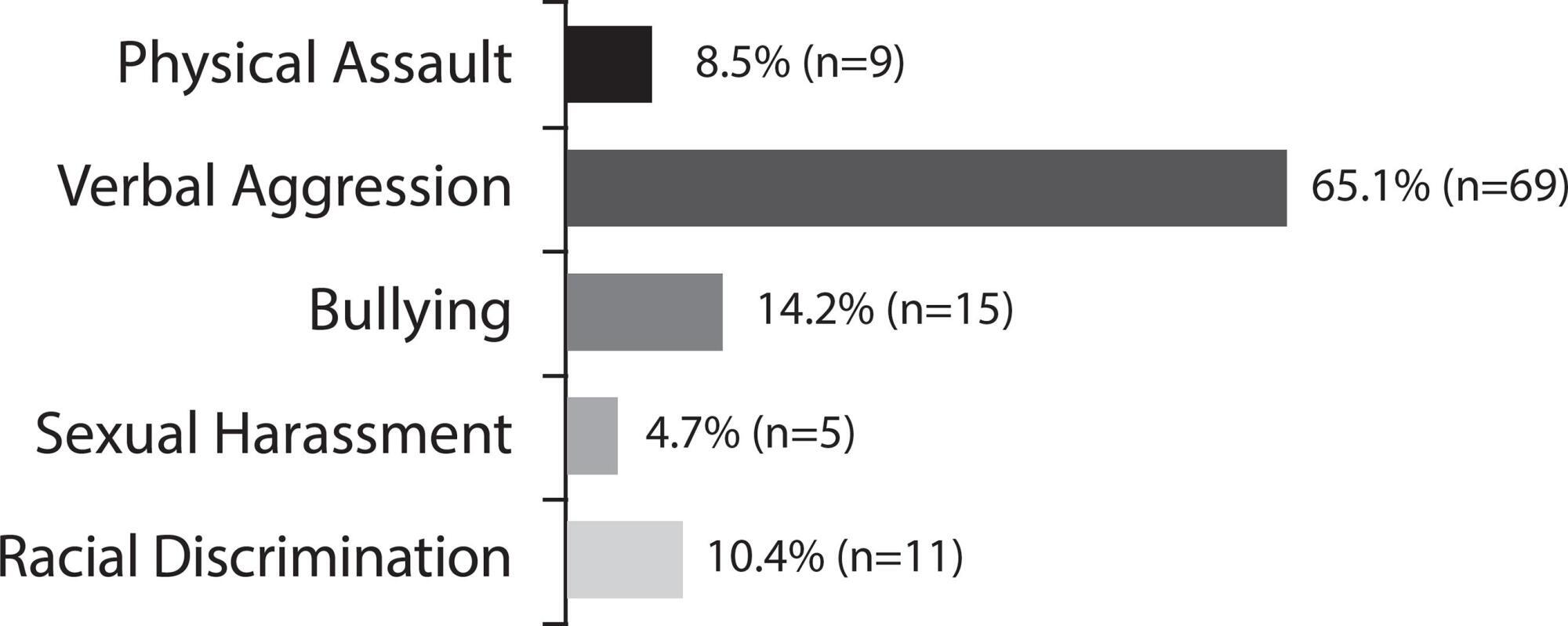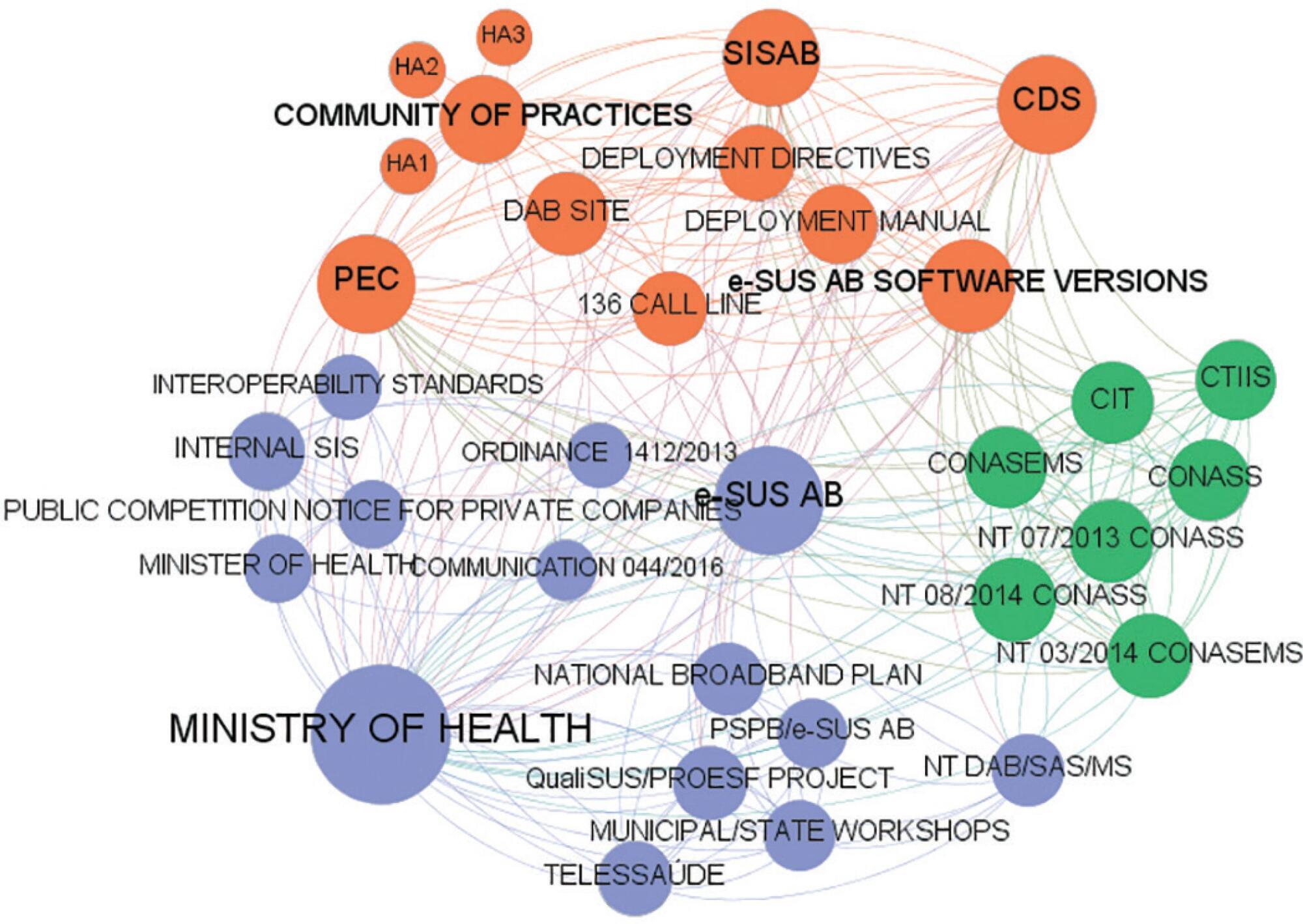-
ORIGINAL ARTICLE
Permanent education and matrix support in primary health care: family health routine
Revista Brasileira de Enfermagem. 2020;73(6):e20190076
08-07-2020
Resumo
ORIGINAL ARTICLEPermanent education and matrix support in primary health care: family health routine
Revista Brasileira de Enfermagem. 2020;73(6):e20190076
08-07-2020DOI 10.1590/0034-7167-2019-0076
Visualizações0ABSTRACT
Objective:
To analyze the understanding of the professionals working on the Family Health Support by about permanent education and matrix support in the daily routine of primary health care.
Methods:
Descriptive research with a qualitative approach. Data were collected through semi-structured interviews with the participation of 19 professionals from different backgrounds. The results were organized based on Thematic Content Analysis.
Results:
Thematic categories emerged from the analysis: Permanent Health Education: knowledge and daily activities; Matrix support as a premise of Permanent Health Education; The principle of integrality as the foundation of the supporting teams; Conditions of praxis in the promotion of Permanent Health Education.
Final Considerations:
The study evidenced that professionals experience their routines within the service and that the sharing of knowledge to transform the reality of users and the territory is based on matrix support and integrality. However, they face structural difficulties in carrying out actions.
Palavras-chave: Education, ContinuingFamily HealthHealth PromotionIntegrality in HealthPrimary Health CareVer mais -
REVIEW
The quality of life of family health professionals: a systematic review and meta-synthesis
Revista Brasileira de Enfermagem. 2020;73(5):e20190645
07-13-2020
Resumo
REVIEWThe quality of life of family health professionals: a systematic review and meta-synthesis
Revista Brasileira de Enfermagem. 2020;73(5):e20190645
07-13-2020DOI 10.1590/0034-7167-2019-0645
Visualizações0Ver maisABSTRACT
Objectives:
to perform a systematic review and meta-synthesis of qualitative studies about the work-related quality of life of Family Health Strategy professionals.
Methods:
this systematic review was developed to answer the following PVO question: “Which factors (variables) are associated with the work-related quality of life (outcome) of Family Health Strategy professionals (population)?” The PubMed, Scopus, Embase, SciELO, Web of Science, LILACS, Science Direct, OpenThesis, OpenGrey, and OATD databases were selected. The meta-synthesis analyzed the main codes and secondary codes of all included studies.
Results:
the database search resulted in 1,744 reports; six were considered eligible for the meta-synthesis. Four factors were considered for the quality of work life: working conditions; work processes; interpersonal relationships; and personal aspects.
Conclusions:
although this study confirms the adequacy of aspects commonly related to the quality of work life, other factors are important in the case of FHS professionals, especially work context.

-
ORIGINAL ARTICLE
Demands for psychosocial support from communities vulnerable to natural disasters
Revista Brasileira de Enfermagem. 2020;73(Suppl 1):e20190213
07-10-2020
Resumo
ORIGINAL ARTICLEDemands for psychosocial support from communities vulnerable to natural disasters
Revista Brasileira de Enfermagem. 2020;73(Suppl 1):e20190213
07-10-2020DOI 10.1590/0034-7167-2019-0213
Visualizações0Ver maisABSTRACT
Objective:
To identify the demands for the psychosocial care of vulnerable communities in the Vale do Itajaí, Santa Catarina
Methods:
Qualitative research, multiple case study, through narrative interviews with health professionals in three municipalities, from January to May 2018. The analysis of the narratives followed a formal analysis of the text, structural description of the content, analytical abstraction, analysis of knowledge, and contrastive comparison.
Results:
The described categories were: Meanings of the demands for support before the flood; Meanings of the demands during the occurrence of the disaster; Meanings of demands after the flood: psychosocial care; Meanings of the demands for monitoring the territory after the disaster.
Conclusion:
The identification of demands for mental health care after the disaster occurs through the search for health services, specific symptoms, and consequences of adapting to the recovery phase, such as migratory processes and temporary housing. The research contributes to the culture of care with a multiprofessional perspective in health care for the population affected by disasters.
-
ORIGINAL ARTICLE
Educational actions: an action research with Family Health Strategy professionals and users
Revista Brasileira de Enfermagem. 2020;73(5):e20180969
07-06-2020
Resumo
ORIGINAL ARTICLEEducational actions: an action research with Family Health Strategy professionals and users
Revista Brasileira de Enfermagem. 2020;73(5):e20180969
07-06-2020DOI 10.1590/0034-7167-2018-0969
Visualizações0ABSTRACT
Objectives:
to identify the factors that influence educational actions, and building with professionals and users proposed educational strategies that encourage popular participation.
Methods:
an action research, in which individual interviews, participant observation and Focus Group were conducted. Sixteen professionals and ten users from 2 Family Health Strategy from Rio Branco, Acre, Brazil participated. The results were organized by using the Thematic Analysis technique.
Results:
the thematic units emerged: Health education as a strategy that encourages changes in the lives of Family Health Strategyusers; Critical reflection on diagnosis of the causes that interfere in educational actions in the Family Health Strategy and proposition of new strategies; Potentialities that encourage the development of educational practices at Family Heath Units; Proposals for improving educational practices focused on soft health education technology in the dialogue dimension.
Conclusions:
the analysis showed a lack of community ties and traditional educational strategies. In the action phase, the actors agreed to participatory changes.
Palavras-chave: Collective HealthCommunity MedicineFamily HealthHealth EducationPublic Health NursingVer mais -
ORIGINAL ARTICLE
Workplace violence types in family health, offenders, reactions, and problems experienced
Revista Brasileira de Enfermagem. 2020;73(Suppl 1):e20190055
06-01-2020
Resumo
ORIGINAL ARTICLEWorkplace violence types in family health, offenders, reactions, and problems experienced
Revista Brasileira de Enfermagem. 2020;73(Suppl 1):e20190055
06-01-2020DOI 10.1590/0034-7167-2019-0055
Visualizações0Ver maisABSTRACT
Objective:
to identify the types of violence that affect the health team in Family Health Units, their offenders, reactions and problems experienced by workers.
Method:
a cross-sectional, concurrent mixed-type research. The Survey Questionnaire Workplace Violence in the Health Sector was applied to 106 workers from Family Health Units. Of these, 18 answered the semi-structured interview.
Results:
verbal aggression (65.1%), bullying (14.2%), racial discrimination (10.4%), physical assault (8.5%) and sexual harassment (4.7%) were prevalent. Patients were the main perpetrators of verbal aggression (79.4%) and bullying (46.7%). Workers responded by telling co-workers and reporting to the boss. Victims remained over-alert, vigilant and tense, relating exposure to violence to absenteeism and the desire to leave the profession.
Conclusion:
verbal aggression is the most common violence with negative impact on workers’ health and work performed.

-
ORIGINAL ARTICLE
Implication of the training ad continuing education process for the interprofessional performance
Revista Brasileira de Enfermagem. 2020;73(2):e20180359
03-30-2020
Resumo
ORIGINAL ARTICLEImplication of the training ad continuing education process for the interprofessional performance
Revista Brasileira de Enfermagem. 2020;73(2):e20180359
03-30-2020DOI 10.1590/0034-7167-2018-0359
Visualizações0ABSTRACT
Objetives:
to analyze the implication of the training/continuing education process of professionals of the Expanded Nucleus of Family Health and Basic Care (Portuguese acronym: Nasf-AB) for their interprofessional performance.
Methods:
a qualitative case study performed with Nasf-AB teams representative of four macro-regions of health of the state of Santa Catarina. Participation of 43 professionals, who answered collective interviews. The results were later submitted to thematic analysis.
Results:
the training is strongly influenced by the Biomedical Model, which acts as an obstacle to interprofessional performance, given the challenges in the daily routine of Nasf-AB professionals. Continuing education emerges as a potential for the successful collaborative work among teams, and between the teams and Family Health professionals.
Final considerations:
there are important limits in the training of professionals. However, the constant interprofessional development promoted by strategies of continuing education contributes to broaden the support and collaborative practices that qualify services and strengthen Basic Care.
Palavras-chave: Continuing EducationFamily HealthHealth PersonnelPrimary Health CareTraining of Human Resources in HealthVer mais -
EXPERIENCE REPORT
Mental health in primary care: experience of matrix strategy in the rural area
Revista Brasileira de Enfermagem. 2020;73(1):e20180236
02-10-2020
Resumo
EXPERIENCE REPORTMental health in primary care: experience of matrix strategy in the rural area
Revista Brasileira de Enfermagem. 2020;73(1):e20180236
02-10-2020DOI 10.1590/0034-7167-2018-0236
Visualizações0ABSTRACT
Objective:
to report the development of Mental Health actions shared between the Family Health Strategy located in a rural area and the Matrix Support Team by showing the communication resulting from this singular configuration.
Method:
report of experience about the implementation of actions of the Family Health Support Center (Portuguese acronym: NASF) in mental health care for a rural population.
Results:
the following health needs were identified: psychoactive drugs consumption, lack of activities for collective care and difficulty with access to service. The expansion of actions and intersectoral involvement of actors were demonstrated as the educational attitudes were implemented.
Final considerations:
the articulation between family health workers, matrix support and community was key for the implementation of mental health care aligned with the psychosocial approach.
Palavras-chave: Family HealthHealth MentalInterprofessional RelationsPrimary Health CareRural Health ServicesVer mais -
ORIGINAL ARTICLE
Computerization of primary health care in Brazil: the network of actors
Revista Brasileira de Enfermagem. 2019;72(2):337-344
04-18-2019
Resumo
ORIGINAL ARTICLEComputerization of primary health care in Brazil: the network of actors
Revista Brasileira de Enfermagem. 2019;72(2):337-344
04-18-2019DOI 10.1590/0034-7167-2018-0381
Visualizações0ABSTRACT
Objective:
To analyze the network of human and non-human actors involved in the computerization of primary health care in the Brazilian federal government.
Method:
A qualitative study that used as a theoretical reference the actor-network theory and as a methodological reference the cartography of controversies. Data analysis was carried out using Gephi software, and through the extraction of reports, informed by the actor-network theory.
Results:
We found a network of 288 connections among 33 actors, composed mainly of nonhuman influencers of computerization. These actors are distributed throughout 3 inter-related communities, and manage the network by defining obligations, penalties, conflicts and intentionalities, thus influencing the success of the intended computerization.
Final considerations:
The network of actors at the federal level generates situations that, in many cases, hamper the successful implementation of a nationwide computerization strategy.
Palavras-chave: Family HealthInformation TechnologyMedical InformaticsNursing InformaticsPrimary Health CareVer mais



